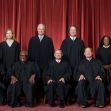On November 13th, the United States Supreme Court introduced its inaugural formal code of conduct for its justices, a response to prolonged external scrutiny and media exposés on undisclosed lavish trips and interactions with affluent individuals.
This inaugural nine-page code outlines that justices must avoid allowing external relationships to impact their professional conduct or decisions. It details limitations on their involvement in fundraising activities and reiterates the constraints on accepting gifts. Additionally, it specifies that justices should not extensively use judicial resources or staff for non-official purposes.
Accompanying the code is a commentary that advises justices to consider the public perception of impropriety when contemplating speaking engagements.
Historically, the life-tenured justices of the Supreme Court operated without a binding ethics code. In a statement, the court acknowledged this led to a perception that justices are exempt from any ethics rules. "To dispel this misunderstanding, we are issuing this code, which largely represents a codification of principles that we have long regarded as governing our conduct," the statement read.
The court has faced scrutiny over undisclosed private jet trips, luxury vacations, and real estate deals involving its justices.
Senator Dick Durbin, chair of the Senate Judiciary Committee, welcomed the code as a positive development but suggested further legislative action might be necessary. He emphasized the need for the Supreme Court to meet the same ethical standards as other federal judges.
Senate Majority Leader Chuck Schumer also recognized the code as a significant initial step but highlighted the absence of an enforcement mechanism as a major shortfall.
Carrie Severino, a former clerk to Justice Clarence Thomas and leader of the Judicial Crisis Network, expressed skepticism about the code satisfying Senate Democrats. She suggested their focus on ethics might be an attempt to intimidate a court they view as too constitutionally adherent.
The introduction of this code comes at a time when the court is experiencing declining public approval following significant rulings on abortion, gun rights, and affirmative action.
Legal ethics experts have mixed reactions. Northwestern University's Steven Lubet acknowledged the code as a respectful response to public demand but pointed out its limitations, particularly the justices' self-determination in recusal decisions. Charles Geyh from Indiana University questioned whether this is a one-time effort or the beginning of a deeper commitment to ethical standards.
Reports by ProPublica and Senate Democrats have highlighted various incidents involving justices, including luxury trips and financial transactions, underscoring the need for such a code.






